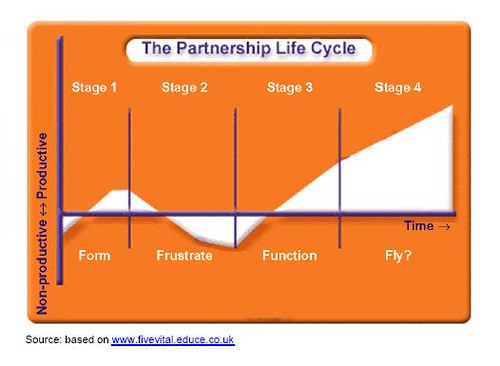Of course this partnership, given the number of people involved on a day-to-day basis, is in many ways very small beer compared to a local strategic partnerships or a community safety partnership. But we have some of the same issues that every partnership has. Even though we're a small close-knit team, we still have the issues of getting two organisations with national profile to come together to achieve a single purpose.
At the beginning of our working relationship, we had the usual issues about learning each others' working style and finding agreement on procedures. Little things could take a while to agree - document control, publication approval processes, etc. It didn't hurt that I used to be employed by the Audit Commission and so had a pretty good idea of the organisational culture and dynamics. Over time these issues became not so much less important, but less apparent, and we could get down to the business at hand without much procedural discussion. Personal relationships in this partnership have been good, too. I'd say that the pattern of productivity described in this fantastic diagram in the comprehensive Suffolk Partnership Evaluation Toolkit pretty much describes how we got on...

But as the partnership winds down and we complete our final products, more people are getting involved, communications, publications, senior management, etc. all the kind of people who need to be involved in the exit strategy.
Now I can see that within the active PMMI team, we've developed our own culture - and as we interact with new people - we have to reiterate the understandings that we've reached within the parternership. We have to recommunicate how the PMMI way does support our separate corporate goals even if we're doing things slightly differently than we'd do things if this was a project run by either single organisation. No one is acting inappropriately, no one in either organisation is deliberately standing in the way - in fact the opposite, everyone is really supportive. But they're being supportive in the way that it's done in each separate organisation. And sometimes that can lead to misunderstandings. So I wonder if the diagram above needs a winding down, with dips below the line on productivity during the exit stage, too.
I'll admit this partnership working thing, it can be frustrating. But I know we've got something good here, something that neither the Audit Commission or the IDeA could have done as effectively on their own. And we're finally going to print on the 2nd editions of our summary guides to performance management - one for managers and one for councillors.
Back to main page
No comments:
Post a Comment